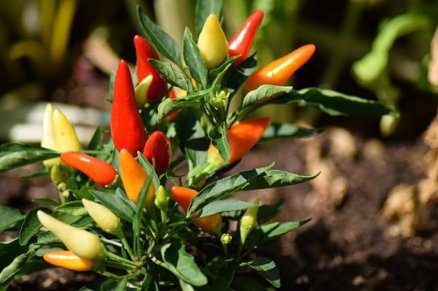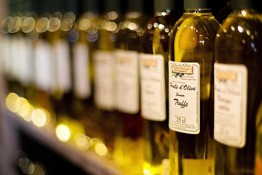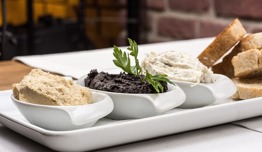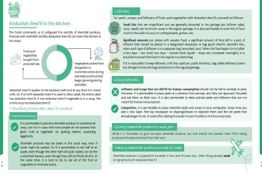Kedushat shevi'it in produce

An introduction to kedushat shevi'it: when does produce have shemitah sanctity? How should such produce be handled? Chapter 3 of the Consumer's Guide to Shemitah.
A. What is shemitah sanctity?
The various crops that "belong" to the seventh year, each crop according to its particular guidelines, have shemitah sanctity (kedushat shevi'it). This sanctity is manifest in several major halachot:
- Fruits and vegetables with shemitah sanctity are ownerless (hefker) and belong to every Jew.[1]
- It is forbidden to buy and sell shemitah.[2]
- It is forbidden to destroy produce with shemitah.[3]
- It is forbidden to eat shemitah produce or process it (cook, squeeze, etc.) in an unconventional manner (for each type of produce).[4]
- It is permissible to use shemitah produce for lighting candles but not for medicine or laundry detergent.[5]
- When a particular crop no longer grows in the field or grove, if crops of that type are left over at home they should be declared ownerless. This is the mitzvah of bi'ur.[6]
- Shemitah produce is exempt from terumot and ma'aserot.[7]
B. Under which conditions does shemitah sanctity apply to shemitah produce?
- Shemitah sanctity applies to fruits and vegetables that grow during shemitah, if the following conditions are present:
- The crop grew in the Land of Israel.[8]
- The land belongs to a Jew (even if the work and gemar melachah[9] is performed by a non-Jew).[10]
- Shemitah sanctity applies to this type of crop.[11]
- The crop reached the stage of growth that determines that it is sacred during the shemitah year (different types of crops have different parameters).[12]
- Shemitah sanctity does not apply to produce imported from outside the Land of Israel (such as rice, sugar, soy oil, various spices, etc.). Nevertheless, agricultural produce that grows in areas conquered during the First Temple period (olei Mitzrayim), but were not sanctified during the Second Temple period (olei Bavel), should be handled as sacred.[13]
- Shemitah sanctity does not apply to crops that grew on land owned by non-Jews.[14] This is also true of crops grown on land sold to a non-Jew through heter mechirah.[15]
- Shemitah sanctity applies to crops growing in hothouses in the soil[16] as well as to crops growing on detached platforms in areas under the open sky.[17] However, it does not apply to produce growing in hothouses on detached platforms. For this reason, vegetables and spices all have shemitah sanctity when that grow on: (1) an open rooftop of a house; (2) an open, unroofed porch; or (3) in the yard. However, plants that grow indoors and in unperforated pots do not have shemitah
- Shemitah sanctity applies also to cooked or baked goods where one of its ingredients have shemitah sanctity (such as soup containing some vegetables with shemitah sanctity) if the quantity of sacred produce makes up more than 1:60 of the mixture.[18]
- Coins used to purchase sacred shemitah produce assume shemitah These coins transfer their shemitah sanctity to other produce purchased with them thereafter.[19]
- It is possible to find sacred shemitah produce in the following places:
- Produce growing in private gardens.
- Agricultural produce sold through Otzar Beit Din.
- For a detailed list of the stages of growth that determine shemitah sanctity for fruit, vegetables, grains, and legumes, see Chapter 5.
C. Miscellaneous laws
- There are posekim who hold that it is a biblical mitzvah to eat shemitah.[20]
- Sacred shemitah produce should not be taken outside the Land of Israel.[21] It is permitted to transport shemitah produce all over Israel,[22] including Eilat and its environs.[23]
In extenuating circumstances, those traveling outside the Land of Israel may take sacred shemitah produce with them for the way.[24]
[1] Rambam 4:24.
[2] Since the Torah states explicitly "for you to eat" (Vayikra 25:6). Chazal expound that this produce is meant "for eating – but not for trade" (Avodah Zarah 62a). Rambam 6:1. For the parameters of the prohibition on trade with sacred shemitah produce, see Chapter 9.
[3] Rambam 5:17. For the parameters of hefsed, see Chapter 18.
[4] Rambam 5:3. See Chapter 16.
[5] Rambam 5:1. See Chapter 16.
[6] The Rishonim disagree on the definition of bi'ur. While Rambam (7:1–3) maintains that bi'ur implies destruction (lit. "annihilation"), most Rishonim hold that hefker is also considered bi'ur. This is the ruling of mainstream posekim today. See, for example: Ramban, Vayikra 25:7; Semag, aseh §148. For more on the topic, see Chapter 24.
[7] Rambam, Hilchot Matanot Aniyim 6:5; Shulchan Aruch, YD §331:19. See also Chapter 10.
[8] Rambam 4:25. On the status of suria (roughly modern day Syria), see Shabbat Ha'aretz 4:27, 8:9.
[9] Gemar melachah: an action performed with produce after its harvest that attests to the completion of the harvesting process.
[10] Kessef Mishneh, ibid., 4:29; Avkat Rochel §24. This was the rulings of: Rabbi Kook, Shabbat Ha'aretz 4:29 §6, cited also in introduction to Shabbat Ha'aretz chap. 11; Mishpat Kohen, §70; Rabbi Frank, Har Zvi, Zera'im II, §39; Kerem Tziyon 19:1; Rabbi Auerbach, Ma'adanei Eretz §2, s.v. veta'amam; ibid. (5768 ed.), 2:23; Rabbi Yisraeli, Eretz Chemdah, addition to gate 5:2; Chavot Binyamin I §9:12; Rabbi Yossef, Yabiya Omer III, YD §19,6—8. According to the Mabit I, §11 (and others), shemitah sanctity applies even to land owned by non-Jews. This was the ruling of the Chazon Ish, §3:8. For a comprehensive discussion, see Shabbat Ha'aretz 4:29 §2.
[11] See Chapter 4.
[12] See Chapter 5.
[13] Following the Rambam's opinion (4:26); Rambam's Gloss on the Mishnah, Hilchot Shevi'it 6:1. This is the ruling of Torat Hashemitah §16:85. See also Chazon Ish §3:21. However, according to the Gra, Shenot Eliyahu I, 6:1, shemitah sanctity does not apply to olei Mitzrayim territory. See Shabbat Ha'aretz 4:26 §2. With regard to separating terumot and ma'aserot in the olei Mitzrayim area during shemitah, see Shabbat Ha'aretz, ibid., n. 12, 15, 19–20. For these boundaries, see Appendix E.
[14] See above §1b; according to some, the Sages of Tzefat excommunicated anyone who considered and handled these crops as sacred: Avkat Rochel §25 on terumot and ma'aserot.
If the land belongs to a non-Jew but the gemar melachah is performed by a Jew, the Mabit holds that the produce has shemitah sanctity, so terumot and ma'aserot need not be separated. However, according to Rabbi Yosef Karo and the Sages of Tzefat, the produce is not sacred at all, so terumot and ma'aserot are necessary. It is for this reason that they excommunicated those who failed to separate terumot and ma'aserot from produce growing on soil belonging to a non-Jew when a Jew performed the gemar melachah. See Mishpat Kohen §70 and Iggerot HaRa'ayah I, §289 who writes that we should be concerned about this excommunication, and thus avoid ascribing sanctity to such produce.
[15] Aderet (Rabbi Eliyahu David Rabinowitz Te'omim), Beshemen Ra'anan II, Kuntres Shevach Ha'aretz §32; Rabbi Kook, Shabbat Ha'aretz 8:8 §5; see also Mishpat Kohen, ibid.; Iggerot HaRa'ayah, ibid.; see also the other posekim mentioned above in n. 10: Ma'adanei Eretz (ibid.); Betzet Hashanah, p. 45 and n. 9, p. 56 §1; Torat Hashemitah §16:87 writes that some are lenient in this regard, but notes that it is proper to be stringent; see also: Kerem Tziyon 19:5; Rabbi Yisraeli, Chavot Binyamin §9:12; Rabbi Yossef, Yabiya Omer III, YD §19 and Yalkut Yosef, Shevi'it 25:8–9. Some, however, handle heter mechirah produce as sacred; see Katif Shevi'it 58:4.
[16] This law is due to doubt. See Kerem Tziyon, chap. 3, Gidulei Tziyon n. 6. According to Rabbi Kook, (Kuntres Acharon §3), Rabbi Kleirs (Torat Ha'aretz 6:25, notes), and Rabbi Frank (Har Tzvi, Zera'im II §35, s.v. vehineh), this doubt also relates to the sanctity of the fruit. However, even according to this opinion, it seems that it is proper to be stringent regarding the sanctity of fruit and its derivatives, as it is a biblical prohibition. This is the conclusion of Rabbi Ariel, "Notes on shemitah-related matters: on shemitah sanctity in the home," HaTorah VeHa'aretz I, p. 174. See also Shabbat Ha'aretz 1:3 §3.
[17] Kerem Tziyon, chap. 11, Gidulei Tziyon, n. 5. According to Rabbi Eliahu, shemitah sanctity in these areas is uncertain. See Shabbat Ha'aretz 1:6 §4.
[18] Rambam 7:22. See also Shabbat Ha'aretz §2. Regarding bi'ur for such products, see Chapter 24, §B.9; with regard to buying and selling such products, see Chapter 9, §A.5.
[19] Rambam 6:6. With regard to bi'ur with these coins, see Chapter 25, §C.8. The original produce retains its shemitah sanctity and the money used to purchase it becomes sacred as well. If other food products are purchased with this newly sacred money, the money's sanctity is transferred to the food (2nd degree sanctity, as it were) and the money becomes desacralized. If afterwards the newly sacred food is sold, the food's sanctity is fully transferred to the money; the money from the sale becomes sacred and the sold food becomes desacralized.
[20] This is the opinion of Ramban in Sefer Hamitzvot, Hosafot asei §3, as explained by Megillat Esther. Rabbi Kook is inclined towards this opinion. See Da'at Kohen §240; Mishpat Kohen §85; Shabbat Ha'aretz 5:1 §1, 6:1 §2; Kuntres Acharon §21. With regards to netilat yadayim before eating shemitah fruit, see Rabbi Kook, Shabbat Ha'aretz 5:7 §2, Kuntres Acharon §25.
[21] Rambam 5:13. See Shabbat Ha'aretz 5:13 §1, 7:12 §2, 8:5 §1–2.
[22] Including those areas not settled by olei Bavel. See Chazon Ish §13:3, and as stated above in §B.2, that shemitah sanctity does apply to the olei Mitzrayim borders—the obligation of bi'ur included, so it would not be problematic to take sacred shemitah fruit from olei Bavel to olei Mitzrayim territory. According to Torat Ha'aretz I 8:61, however, this is forbidden. See also Shabbat Ha'aretz 5:13 §2.
[23] See Appendix E. See also Rabbi Ariel, "Bringing shemitah fruit to Eilat," Emunat Itecha 104 (5774), who permits this.
[24] This is the ruling of Rabbi Yisraeli, Rabbi Elyashiv, and Rabbi Wosner; see Mishpatei Eretz 20:2. Rabbi Eliahu forbids this, however.




